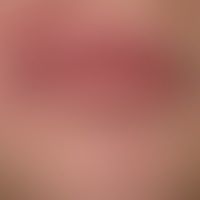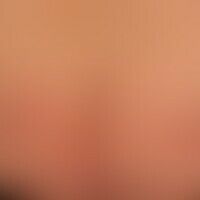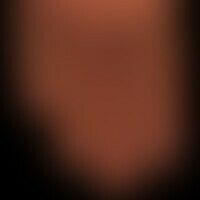Image diagnoses for "Plaque (raised surface > 1cm)"
581 results with 2909 images
Results forPlaque (raised surface > 1cm)

Nontuberculous Mycobacterioses (overview) A31.9
Mycobacterioses, atypical. 3 months old, developing from a red papule, firm, covered with whitish scales, free of scales at the edges, red-brown, completely painless nodule. culturally proven infection by M. marinum.
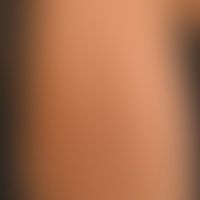
Lichen simplex chronicus L28.0
Lichen simplex chronicus: 14x7.0 large, itchy, blurred plaque with rough surface on the right forearm of a 32-year-old female patient; the papule structure of the lesion is distinctly skin-coloured and occasionally scratched.

Atopic hand dermatitis L20.8
Hand eczema atopic: long-term atopic eczema with variable course; the skin on both backs of the hands has existed with varying intensity for 1.5 years.

Cheilitis actinica (overview) L57.8
Severe actinic cheilitis in Xeroderma pigmentosum: 43-year-old Iraqi-born patient with poikilodermatic skin, with patchy pigmentation in the sun-exposed areas of the cheek and neck, and numerous basal cell carcinomas.
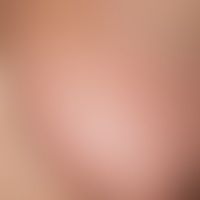
Parapsoriasis en plaques large-hearth-poicilodermatic L41.5
Parapsoriasis en plaques large-heart poikilodermatic: a sympothless, slowly progressive clinical picture that has existed for several years, with poikilodermatic changes consisting of reticular lichenoid, pityriasiform scaling, papules and plaques and central atrophy of the skin.

Crusted Scabies B86.x1
Scabies norvegica: excessive infestation with dirty-brown, keratotic changes in the area of the face.

Nummular dermatitis L30.0
Nummular dermatitis: General view: Sharply defined, 2-6 cm large, inflammatory reddened, coin-shaped plaques in a 7-year-old girl.

Pemphigus erythematosus L10.4
Pemphigus erythematosus (state after UV-provocation): since about 2 years recurrent, symmetrical skin changes localized in the seborrheic areas. After pretreatment flat depigmentations so oral, scaly palques. On the lower left side the UV-provoked square area (isomorphic irritant effect).

Guttate psoriasis L40.40
Psoriasis guttata: acutely and de novo appeared, 0.1-2.0 cm large, reddish, rough papules and plaques with fine-lamellar scaling on the trunk and extremities in a 24-year-old woman. A feverish streptococcal angina preceded this. After healing of the initially manifested symptoms, a longstanding chronic, intermittent course of psoriasis followed.

Candida granuloma B37.2

Rowell's syndrome L93.1
Rowell's syndrome: acute "multiform" exanthema in subacute cutaneous lupus erythematosus.

Nevus melanocytic congenital D22.-

Keratosis lichenoides chronica L85.8
Keratosis lichenoides chronica: generalized eminently chronic, moderately itchy clinical picture with reddish, firm, papules and plaques with scaling.

Leprosy (overview) A30.9
Leprosy (overview): Borderlinelepromatous leprosy (BB), plaques and dome-shaped punch-out lesions.



